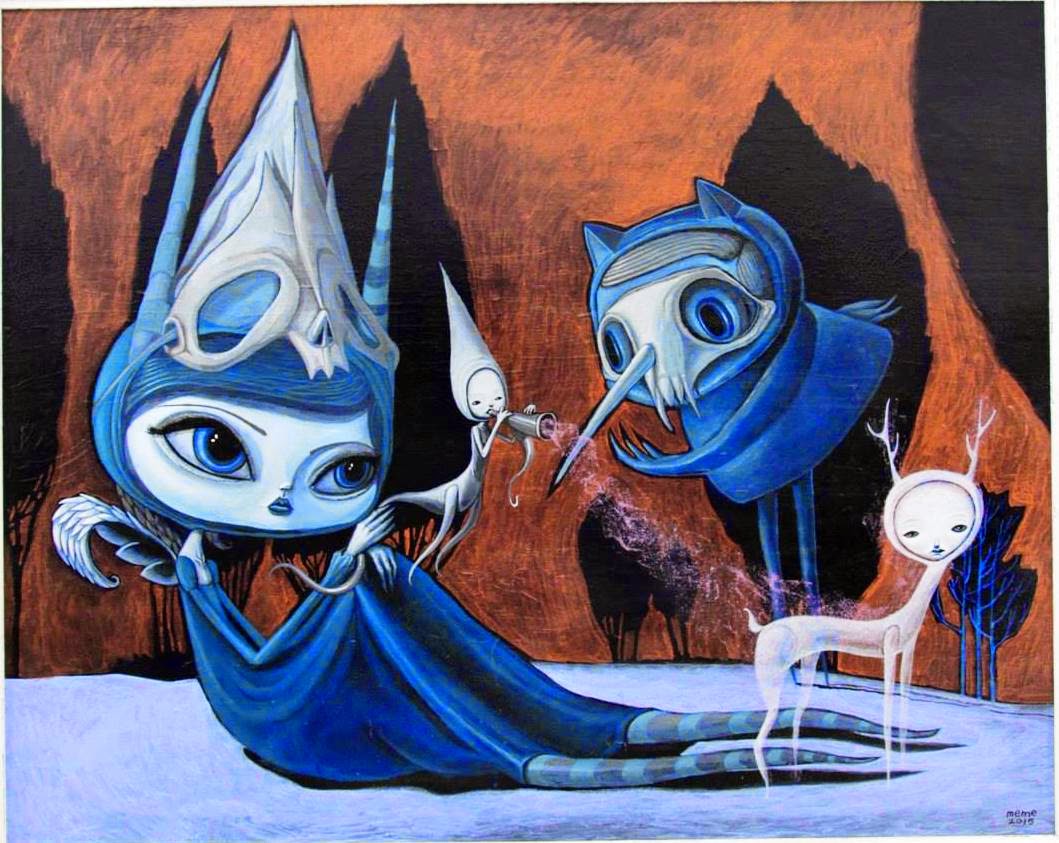It is easy to dismiss Khairul Azmir Shoib’s works as mere illustrations, yet his fantastical characters have persisted in the local visual arts for the past 15+ years. The success of his mentee Haslin Ismail, whose mecha / book collage creations are even more irreverent, is perhaps indebted to Meme in setting precedence for the appreciation of such non-canonical art. Viewing these exhibits, one can find common elements with Malaysian contemporary art – skulls aplenty, found wood, and gaudy frames – apart from the badly-done drips evident in ‘Gothic Kebaya’. All portraits feature the protagonist, whose obvious features manifest in different guises – a giant head, large eyes, and a high forehead.
| Image may be NSFW. Clik here to view.  |
| Nightwish (2015) |
With a sidekick always in tow, Meme’s female lead is more hopeful heroine than psychological avatar, contrary to the isolation theme stated in the catalogue essay. Gina Fairley writes in a previous exhibition, “(w)hile we want to read Meme’s drawings and paintings within the realm of illustration, rather they are fragments of a fantasy that are extremely open ended to interpretation and, if anything, enter an isolationist position of alter-egos, psychosis, and introspective dreams – the space of non-narrative.” As compared to his solo exhibition “Let It All Rain Down from the Blood Stained Clouds” held two years ago, a black background now becomes a fairy tale landscape, none prettier than the bronze darkness in ‘Nightwish’ and ‘In the Shadow of the Horns’.
| Image may be NSFW. Clik here to view.  |
| Tulip - the Dog that Ate Nightmares #14 (2013) |
The improved mastery in painting, is testament to the artist’s continuous growth and willing engagement with different mediums and styles. Such regular experimentation is rare among Malaysian artists, but Meme’s efforts are easily overlooked due to his signature fantasy themes, myself guilty in past assessments of his output. Cute characters in a surreal landscape are the stuff of inspirational folklore, and these pictures should not be dismissed just because it contains no overt references to Puteri Gunung Ledang. In the exhibition’s best work, ‘Sisters’ juxtapose a skinny mannequin with an elegant figure dressed in sumptuous blue, the applied chiaroscuro effectively portraying a silent drama. Give me beautifully drawn sombre melancholy, over vacant images of regurgitated politics, anytime, anywhere.
| Image may be NSFW. Clik here to view.  |
| Sisters (2015) |
